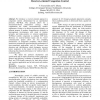Free Online Productivity Tools
i2Speak
i2Symbol
i2OCR
iTex2Img
iWeb2Print
iWeb2Shot
i2Type
iPdf2Split
iPdf2Merge
i2Bopomofo
i2Arabic
i2Style
i2Image
i2PDF
iLatex2Rtf
Sci2ools
CN
2002
2002
TCP-Real: receiver-oriented congestion control
We introduce a receiver-oriented approach to congestion control, demonstrated by an experimental protocol, TCP-Real. The protocol allows for a measurement-based transmission strategy, which complements the "blind" increase/decrease window adjustments. Owing to its design, the protocol displays an inherent property to produce comprehensive dynamics in heterogeneous environments with wired or wireless networks and delay-sensitive or -tolerant applications. TCP-Real controls congestion as standard TCP does. However, its receiver-oriented nature and its "wave" communication pattern allow for two amending mechanisms: (i) Congestion avoidance, which reduces unnecessary transmission gaps that hurt the performance of time-constrained applications, and (ii) Advanced error detection and classification, which designates recovery tactics responsive to the nature of the errors, thereby enhancing the protocol performance over wireless links or asymmetric paths. We detail the prot...
| Added | 17 Dec 2010 |
| Updated | 17 Dec 2010 |
| Type | Journal |
| Year | 2002 |
| Where | CN |
| Authors | Vassilios Tsaoussidis, Chi Zhang |
Comments (0)

